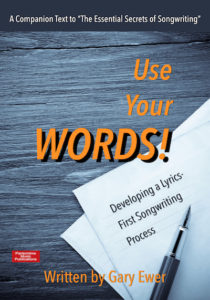I’m fond of pointing out the similarities between all the different genres of music, because it reminds me that no matter what style of music we call our own, we’re all trying to do the same thing: touch the emotional soul of the audience.
For most musical genres, the main differences with songs lie in performance style. It’s very easy to take a classical tune, like Mozart’s famous Sonata No. 11 in A, K. 331, movement 3 (the “Turkish March”), and turn it into a respectable reggae version, a bluegrass version, or even something akin to klezmer-jazz.
 If you’re trying to develop a lyrics-first songwriting process, but aren’t having much luck, give this ebook a read: “Use Your Words! Developing a Lyrics-First Songwriting Process.” Right now, it’s FREE with your purchase of “The Essential Secrets of Songwriting 10-eBook Bundle.”
If you’re trying to develop a lyrics-first songwriting process, but aren’t having much luck, give this ebook a read: “Use Your Words! Developing a Lyrics-First Songwriting Process.” Right now, it’s FREE with your purchase of “The Essential Secrets of Songwriting 10-eBook Bundle.”
Because there are so many similarities in the structural bones of most songs, I find myself also trying to identify the main differences. What are the differences between, let’s say, pop and classical composition that go beyond performance style?
I think one of the main differences pertains to lyrics, in these main ways:
- Pop lyrics assume a conversational style; classical lyrics tend to be formal poetry.
- Pop lyrics are often written, changed and honed as the songwriting process progresses, often even in lyrics-first processes; classical lyrics are usually written before the composition process even begins.
- Pop lyrics (especially these days) are the results of collaborations between several writers; classical lyrics usually have one writer.
Most of the time I suggest to songwriters that you can’t go wrong in borrowing the same techniques that classical composers used. But with lyrics, I think the classical approach would need to be used with some caution.
If you’re a lyrics-first songwriter — someone who likes to get the lyric down and more or less finished before the music is started — here’s how a classical approach might work, with some caveats:
1. Formal Poetry as a Lyric
Yes, you can use formal poetry in a pop music setting, BUT: Be sure that the lyrics have moments that can truly touch the heart of the listener. The expectations of a pop song audience will be understandably different from the expectations of a classical audience. Classical songs are often longer than pop songs, and so there is more time to make that all-important connection.
In lieu of a conversational style, make sure that your poem finds other ways to pull the audience in. Mainly, you’ll want to be sure that your lyrics alternate between being descriptive (“this is what I’m talking about…”) and being emotional (“this is how I feel about it..”).
2. The Poem as a Separate Entity
For most pop songwriters, the lyric is something that can and usually does change as the music part of the song is written. But if you’ve written a lyric that you want to work as a stand-alone poem, with no intention of changing it once you start setting it to music, all it requires is that you work and rework it with its eventual use as a lyric in mind.
When you finish your poem, you’ll want to begin the process of setting it to music by reading it melodramatically to find the obvious ups and downs in the way the words will be sung. Try to find a natural rhythm to the delivery of the words.
If you find there are moments that don’t lend themselves well to being placed within a pop song, it may only require that you change the way you deliver the lines. Change the rhythms; find new ways to communicate the words by elongating words that might usually be delivered in a different way.
For example, see how many ways you can say the following line, by lengthening some words, shortening others, and placing your voice unexpectedly higher or lower:
In quiet solitude, my feelings replied/ That I would never, ever be satisfied.
3. The Poem as a Non-Collaborative Element
If you typically work as part of a songwriting partnership or as a member of a band, present a completed poem as the element that you’d like to have remain intact. It can be very interesting to see what other musicians pick up from your poem. How do the words guide their compositional process?
In general, I think songwriters should embrace the fact that the pop music approach to writing lyrics will differ considerably from the classical approach. But the classical approach, particularly the three aspects outlined above, can be taken on as a creative diversion from the way pop lyrics are usually written, with very creative results.
 Written by Gary Ewer. Follow Gary on Twitter.
Written by Gary Ewer. Follow Gary on Twitter.
 “The Essential Secrets of Songwriting” 10- eBook bundle comes with a free copy of “Use Your Words!” Learn how to put lyrics front and centre in your songwriting process. It’s FREE when you buy “The Essential Secrets of Songwriting 10-eBook Bundle ($37 USD)
“The Essential Secrets of Songwriting” 10- eBook bundle comes with a free copy of “Use Your Words!” Learn how to put lyrics front and centre in your songwriting process. It’s FREE when you buy “The Essential Secrets of Songwriting 10-eBook Bundle ($37 USD)











Pop lyrics writing tips are just wonderful.